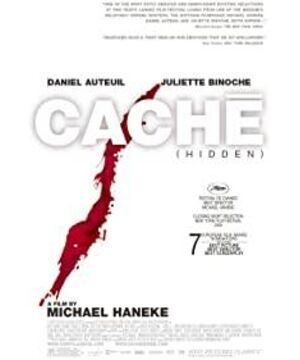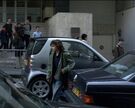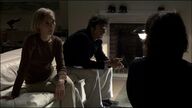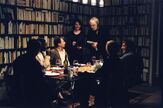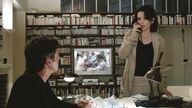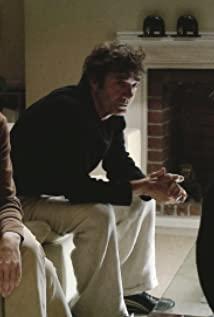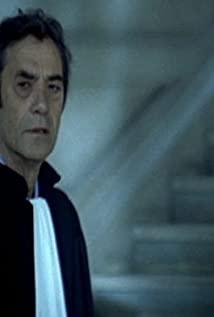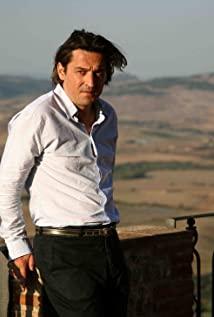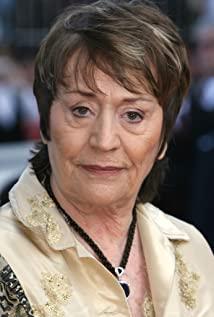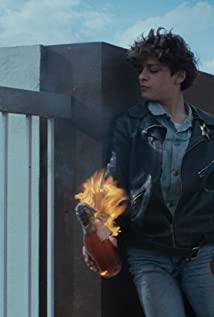There is still suspense at the beginning of the film, which brings the audience to the format of a regular suspense film. Who is the culprit of the peeping? What is the purpose of leading George to 407, and what kind of shadows did George's childhood have, and what kind of connection did he leave with his brother? The audience will undoubtedly be guided in this direction. As the film draws to a close, they breathe harder and wait with bated breath, looking forward to a great secret of suspense. However, the biggest suspense is the unresolved suspense. Haneke is obviously a guy who can't get along with the audience (the remote control scene of "Fun Game" already makes the audience dumbfounded). He knows that if it is made into a general thriller, it can only satisfy the audience's low-level tastes of being curious and inquiring about the roots. Obviously, he was not satisfied with this, and gave the audience with this mentality a fierce ridicule. The camera is just a fake instrument. In fact, it never existed, so the real culprit was nothing.
This is clearly revealed from the long shot of the penultimate act. The language of the film is clear, and the long shots with static and fixed scenes all refer to the video shots, such as the scene in front of George's house in the first half, and the quarrel between George and his childhood friend in the second half. These frozen images are telling the audience that this is a perspective from a third party, and this is a footage related to the camera. Until the end of the film, the climax of the reality of the story is set off, and the supplementary narrative of the childhood also comes to an end. At this time, the director used a long, fixed panoramic lens to once again simulate the camera recording the process of how friend George was forcibly evicted. This camera recording image, which has appeared at least 30 years ago, clearly tells the audience: In fact, no one is setting up this camera. It can be the eyes of the director, the eyes of the audience, or even the eyes of God.
The ambitious proposition of the story has not been concealed. God is watching you, this "Trumen's World" has also appeared before, but it appears in a gentle form without sharp weapons. Haneke made all this more naked, more straightforward, and more off guard. George told his wife that I had never been to Room 407 and saw no one in it. You are surprised why you lie about this kind of thing. You think it is a matter of course for the husband and wife to share the fear; but when they turn around, the wife and Pier, But intimacy at a warm and affectionate dining table, you were surprised that the wife who dared to act with her husband a second ago also had an affair; and when friend George didn’t say a word and struck hard on the neck, I yelled and stared blankly. With the spurting blood, there is no other room for thinking. Human nature has come so complicated, death has come so unexpectedly, and all of this has nowhere to hide, and it is shown naked to you. And Haneke’s depiction of human nature is by no means confined to his face in major incidents. You can see that when George asked his wife to invite guests away, the character that he feared to offend and not save face was just a life. Falling down in front of him, George, at this moment, would still delay the question of how to invite guests away.
Haneke seems to be a critic of contemporary media. In "Hidden Camera", his criticism of television, books, video tapes and other media or media is lightly concealed. Like "Requiem for Dreams", TV shopping and TV variety shows are not only a background noise, but sometimes they are the force that pushes the characters more and more to death. The murder of Haneke’s "Fun Game" is also submerged in the noise of the TV show. The heroine desperately wants to turn off the TV. It seems unreasonable, but it conceals the director’s so-called media industry and journalism. 'S ridicule. The protagonist of the film, George, is not only a cultural person, but also a media person. He appeared in the TV chat program as a literati (this reminds me of Liang Wendao and "Qiang Qiang", of course, there is no analogy or metaphorical meaning), And accept the random editing of the chat by the TV editors. This kind of editing doesn't harm it out of context, it just needs to be gimmicky and hot. The director satirized George and also satirized the television media behind him. He slapped the so-called intellectuals on TV, and the media put them on a glamorous coat, but did not give them a fig leaf behind the screen.
The Georges' TV, with books and CDs in all directions, has a weird display, and it has become the iconic scene of the film. This startling scene arrangement is precisely the director's deliberate enhancement of these things and the deliberate disclosure of views. Under the bleak white light, George's house was as cold as a snow cave, and there was a chill to the bones everywhere. This hue is not only a repetition of the technique of "Fun Game", but also a neutral, unsentimental look that hides the camera's objective perspective.
Haneke has listed ten films that have had the most impact on him. Most of the films on the list are suspense and thrillers, and there are many suspense masters such as Hitchcock and "Alien" director Scott. In addition to absorbing the essence of the suspense film, he also added a film attitude with the label of Haneke. In this respect, Kubrick’s "Eyes Opening Ring" that he cited at the same time has something in common. They make the flow of logic no longer the lifeblood of the suspense film, and the incomprehensibility and humanity beyond the suspense are intangible. It is the most lingering impression.
View more about Caché (Hidden) reviews


